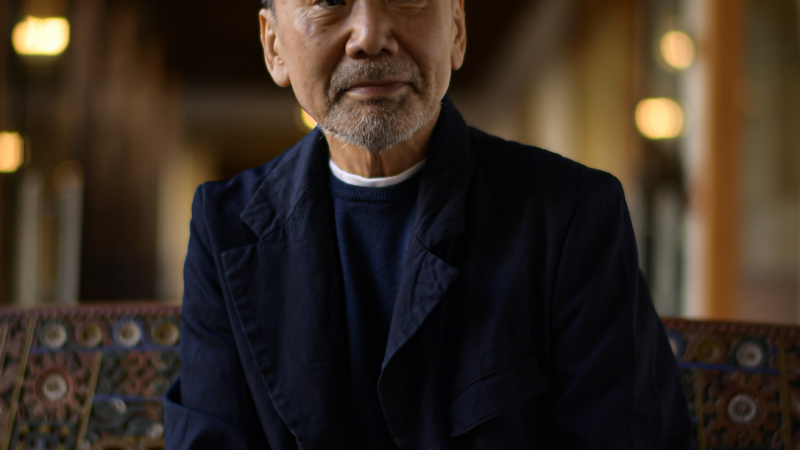It was ‘great relief’ for Haruki Murakami to finish his latest novel
It’s hard to explain what The City and its Uncertain Walls is about. It opens with a guy whose job it is to read dreams. Those dreams are stored on shelves of a library. And that library exists in a town that is surrounded by a wall, with a Gatekeeper watching the one entry point. Oh, and each person has a shadow — one that can live independently from its…host? Source? Person?
It’s Haruki Murakami’s first novel in six years. And it’s actually a re-visiting of a novella he wrote in 1980. In an interview conducted through a translator via email, he talked about his inspirations behind the new book, how he feels about getting older and his unyielding love for The Great Gatsby.
The City and its Uncertain Walls has its origins in a short story you wrote and published in 1980. The novel is also connected to a previous book you wrote, Hard-Boiled Wonderland and the End of the World. How do you feel when you’re revisiting work you wrote decades ago?
The 1980 novella I wrote, “The City, and Its Uncertain Walls” is the only work of mine I haven’t allowed to be reprinted. It appeared in a magazine, but I didn’t let it be published in book format. The reason is that when it was published in the magazine, I felt it was still raw and immature. The theme I explored in that story was a very important one for me, and what I wrote about was, you might say, an inception point for me as a novelist. The problem was I lacked the requisite writing skills at the time to convey the story the way I thought I should. So I had decided that I would go back to it and do a complete rewrite once I had acquired the necessary experience and writing expertise.
In the meantime, however, other projects came up that I wanted to tackle, and some 40 years passed by (in the flash, it seemed) without me getting back to work on that story. By then I was in my 70s, and I thought maybe I don’t have all that much time remaining. So it’s a great relief to manage to finish writing this novel now, from a fresh perspective. I feel like a great weight has been lifted from my shoulders. If I could live 40 more years, who knows — maybe I’ll rewrite it one more time.
You write beautifully about loneliness, longing and love in this novel. What can surrealist, magical fiction say about these themes that realistic fiction can’t?
I’ve never thought of my writing style as surrealistic, or as magical realism. I simply write the stories that I want to write, and in a style that suits me. When I write fiction, the story sort of moves on ahead naturally, like flowing water following the lay of the land. All I’m doing is putting this flow into words, as faithfully as I can.

You started writing this The City and its Uncertain Walls in March 2020, so you rarely set foot outside and spent most of your days working on this novel. In the Afterword you write “Those circumstances might be significant. Or maybe not. But I think they must mean something. I feel it in my bones.” Now that some time has passed, how do you see the pandemic’s influence on your writing of this novel?
Writing this novel required a certain amount of peace and quiet, and contemplation. And, depending on your viewpoint, that town surrounded by walls might be viewed as a metaphor for the worldwide lockdown. How is it possible for both extreme isolation and warm feelings of empathy to co-exist? That was one of the significant themes of this novel.
Shadows play a major role in this book. What is it about the concept of shadows and pairs that captivated you?
The first person main characters in my novels are, to put a fine point on it, not the real me, but perhaps the me that might have been. I find it fascinating to pursue that multiplicity of possibilities, and it’s one of the real joys I’ve experienced as I’ve written novels over the years. We seldom have the opportunity in life, after all, to become someone other than ourselves.
Perhaps human beings aren’t single entities, but composite beings, constructed of different selves. And maybe it’s possible for the real self and the shadow to be interchangeable — a thought that often strikes me as I write my stories.
Is there another previous story you’ve written that you think about revisiting?
No, there isn’t. There are works, of course, I’m not satisfied with, but I don’t feel like rewriting any of them. Among the works I’m not satisfied with, there are ones I have regrets about, and ones I don’t. In life there are inevitable, necessary mistakes, and there are mistakes you have to rectify.
You’ve written that everything you know about writing, you’ve learned from music. If that’s still the case, how important is it to you to discover music that is new to you? Is there anything left for music to teach you about writing?
It’s when you’re young that you feel music most keenly, when it really penetrates your heart and soul. Usually this means the period from your teens to your 20s. When I was that age, I absorbed plenty of amazing music and learned a lot of important lessons from it. Nowadays….I simply enjoy listening to good music.
In some of your interviews over the past few years, you’ve been asked about your female characters. As you see it, what are the criticisms or concerns that have been raised?
At a certain point I completely stopped reading criticism (it’s true), and I’m sorry but I don’t know the context of that particular criticism. In general, you could say I have limitations as a human being, and so do my novels, so it’s only natural that I get criticized for something. If people enjoy my work, it makes me happy, of course, but if they don’t then all I can do is tell them I’m sorry.
You are a huge F. Scott Fitzgerald fan, and I know you’ve translated his work. Next year will mark the 100th anniversary of The Great Gatsby. How did your relationship and understanding of the book change or grow after you worked on its translation?
One thing I felt quite strongly as I translated The Great Gatsby was that Nothing needs to be added to this novel, and nothing is extraneous. It goes without saying, but there are very few other novels with those qualities, which explains why Gatsby has stood the test of time over the past hundred years. It’s truly a magnificent, remarkable achievement. For me, translating this novel into Japanese was both a difficult challenge and an endless source of joy.
What are you working on now?
It’s a secret.
Snowboarder’s death in Swiss Alps avalanche is a reminder that even pros face risk
The death of an Olympic snowboarding athlete is a reminder that even the most skilled and experienced athletes are not immune to the threat of avalanches, and that knowledge is key to staying safe.
Scientists await signal from spacecraft after historic close encounter with the sun
To get so close, the Parker Solar Probe had to withstand the sun's extreme heat and radiation like no spacecraft before it.
Mega Millions jackpot surges past $1 billion
The Mega Millions prize has now grown to an estimated $1.15 billion, which could be the fifth-largest jackpot in the game's history.
Pope urges ‘all people of all nations’ to silence arms in Christmas address
Pope Francis in his traditional Christmas message urged "all people of all nations" to find courage "to silence the sounds of arms and overcome divisions" plaguing the world, from the Middle East to Ukraine, Africa to Asia.
A gang attack on a Haitian hospital reopening kills 2 reporters and a police officer
Street gangs forced the General Hospital in Port-au-Prince to close earlier this year. As journalists gathered to cover its reopening, suspected gang members opened fire.
Far from the front lines, Ukrainians fight a war to preserve their culture
In the Transcarpathia region, some locals embrace a traditional lifestyle and cultural identity. After surviving Soviet threats, now they fear President Vladimir Putin seeks to erase their culture.





